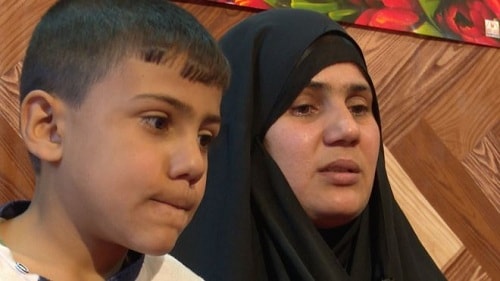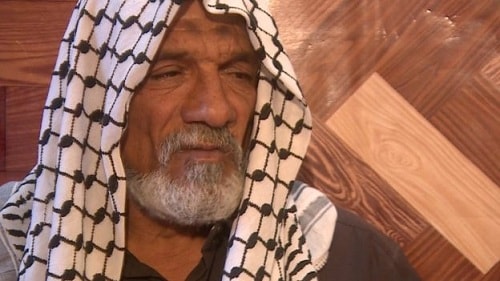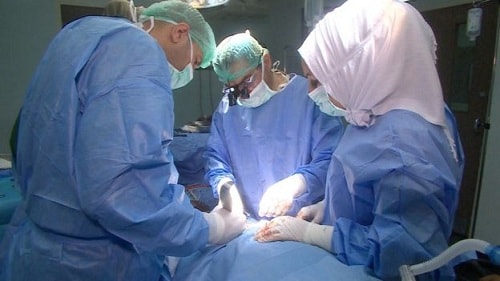Iraqis sell organs to make a living
Om Hussein, like millions of other Iraqis, struggles to feed his family of six.
 |
Oma Hussein, a mother of four, cries because she cannot afford to support her family. Photo: BBC |
According to the BBC, her husband Ali is unemployed and has diabetes and heart disease. Om has been the breadwinner for the past 9 years, trying to support the family by working as a maid, but now she is exhausted and unable to work anymore.
“I am so tired, we cannot pay the rent, medicine, food and essentials for the children,” said Om, sitting in a makeshift bedroom in eastern Baghdad.
The dilapidated house collapsed a few months ago, and her family has had to rely on friends and relatives to take care of them.
"I do all kinds of jobs. From selling meat, to porterage, to collecting trash. I tell my son to pick up discarded bread for the family to eat, but I never beg for food or money," Ali added.
Faced with poverty, Om had to sacrifice his body and decided to sell his kidney.
"I decided to sell my kidney," she said. "I couldn't work to support my family anymore. Selling my kidney was better than selling my body or living on charity."
The couple asked an underground organ dealer to sell their kidneys, but tests showed that their organs were not suitable for transplant. Disappointed, the couple thought of another desperate solution.
"Since both of our bodies are not well, we thought of selling our son's kidney," Ali said, his voice shaking, pointing at his 9-year-old son. "We would do anything but beg for mercy. Why did we have to go through this?"
But in the end they did not sell their son's kidney, because just thinking about it broke the parents' hearts.
Organ trafficking industry
Poverty fuels kidney and organ trafficking in Baghdad. Of Iraq’s 30 million people, 22.5% live in poverty, according to 2014 World Bank statistics.
Organ trafficking gangs often offer $10,000 for a kidney, making this poor country the new center of organ trafficking in the Middle East.
“This phenomenon is extremely widespread, but the authorities are not capable of handling it,” said Firas al-Bayati, a human rights lawyer.
"In the past three months, I have worked with 12 people who were arrested for selling their kidneys. Poverty is what drove them to do it."
"Imagine this: An unemployed father who has no money to support his children sacrifices himself. I consider him a victim and will protect him."
 |
Ali is unemployed, has diabetes and heart disease, and wants to sell his kidney but cannot because he is not healthy enough. Photo: BBC |
The Iraqi government passed a new law against human and organ trafficking in 2012. Under the new law, only relatives are allowed to donate organs to each other and by mutual agreement. However, organ traffickers often forge identity documents for both buyers and sellers, making them appear to be related by blood.
Penalties for organ trafficking range from three years in prison to the death penalty, according to al-Bayaty, with judges not taking poverty into account when mitigating sentences.
"It is very easy to forge identity documents. However, the government will soon introduce a new type of biometric identification card that cannot be forged,"al-Bayaty said.
Wrong business direction
The BBC has been granted access to an Iraqi prison, where it is difficult to meet a man who has been convicted of selling kidneys. After passing through several security checkpoints, we meet Mohammed. There are 10 other people also convicted of organ trafficking in the prison.
“I didn’t feel guilty at first,” said Mohammed, who has two children.
"I considered it a humanitarian job. However, after a few months working in this industry, I began to question its ethics, stemming from the miserable conditions of the organ sellers. It pained me to see young people having to do this for money."
Mohammed was arrested in front of a public hospital in Baghdad in November 2015, after a police officer disguised himself as a buyer.
 |
Surgeons in Iraq admit it is impossible to thoroughly review every kidney transplant record. Photo: BBC |
Most illegal transplants are performed in private hospitals, especially in Iraq's autonomous Kurdish region, he said, where there are fewer restrictions than in Baghdad.
However, organ transplants can still be performed in public hospitals. Surgeons themselves admit that it is difficult to review the records of each kidney transplant.
"There is no law in the world that holds surgeons responsible for this," said Rafed al-Akili, a surgeon at the Kidney Diseases and Transplant Center in Baghdad.
"In fact, we have some suspicions, but not enough to cancel the surgery because without the transplant the patient will die."
According to VNE
| RELATED NEWS |
|---|








